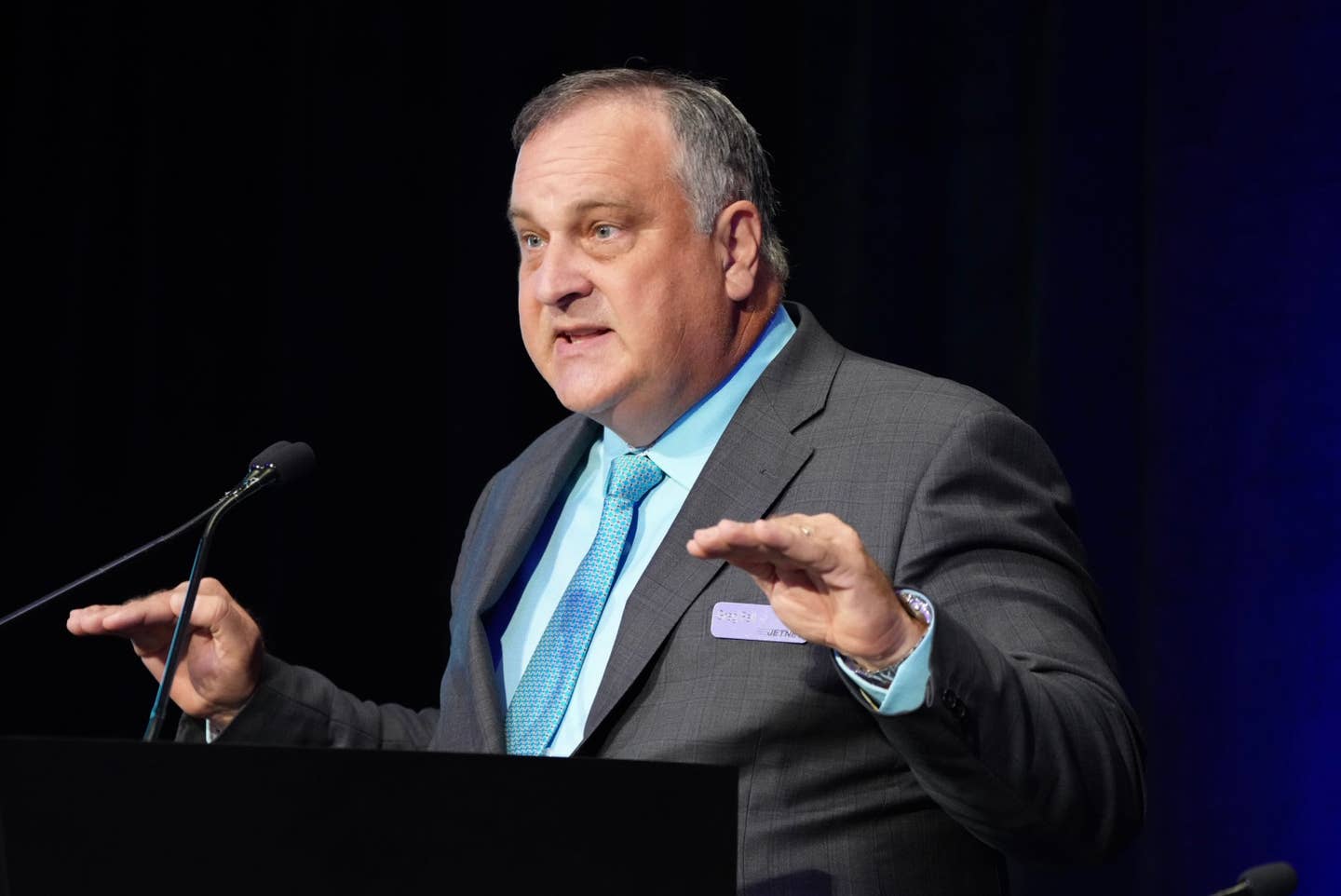JetNet CEO Greg Fell Issues a Call to Arms on Sustainability
CEO urges industry stakeholders to do all they can to improve sustainable offerings for the industry or risk disruption.

At the 11th JetNet iQ Summit focused on sustainability, CEO Greg Fell issues a call to arms. His sentiments are shared across the industry as others look to improve the production of sustainable aviation fuel (SAF) and find other innovations to reach net-zero carbon emissions by 2050. [Courtesy: JetNet]
As the JetNet iQ Business Aviation Summit got underway this week in New York City, the company's CEO, Greg Fell, seized an opportunity to urge the industry to do all it can to ensure a more sustainable future. "We must be leaders in adopting sustainable aviation fuels and carbon offsets," Fell said during one of the event's sessions, appropriately titled “Sustainability: Getting to Our Bluer Skies,” and in a statement shared with FLYING.
In its 11th year, the JetNet iQ summit brings together the business and thought leadership of the business aviation industry. JetNet is a leading provider of aviation market information and delivers business aircraft research to clients worldwide.
This year's conference theme is “Bluer Skies. Greener Future,” which explains the CEO's prodding.
"If we wait, we will be disrupted by this issue," Fell implored in what sounded like a call to arms to the industry. "The 60-year-old executive flying in a business jet may not care. But the 40-year-old executive flying in a business jet does care. That difference is enough to disrupt our industry. Waiting is not a strategy."
Fell continued, "The drive to sustainability is real, and we are about to be disrupted by this issue….This disruption is going to happen. If you are a student of disruptions, you know how these things work. We can be leaders, or we can wait to be disrupted. I believe we should be leaders."
Industry-Wide Interest
Fell isn't alone. Across the industry, the theme of sustainability has been at the forefront of many stakeholders' minds. At the same time aviation business leaders are meeting at the JetNet summit in New York, the U.S. Chamber of Commerce is hosting its Global Aerospace Summit in Washington, D.C.
Ahead of that event, Carol B. Hallett, a 5,000-hour pilot who has served as legal counsel to the chamber, commented on the issues the aviation industry is facing today and named sustainability a key topic.
At the time, Hallett said that there was a lot the industry had to do to achieve more sustainable solutions. "First, we are redeveloping old technology—creating better engines, modeling more aerodynamic planes, and utilizing technology that ensures planes get from point A to B as fast as possible with as minimal a carbon footprint as possible," Hallett explained. "Second, aviation fuel and engines are changing, with the industry looking at hydrogen, developing biofuels, and inventing new cleaner mixtures."
Progress, but Slowly
One indication that things might be trending in the right direction is the recent Inflation-Reduction Act that makes tax provisions for sustainable aviation fuel (SAF) production and reduces carbon emissions by roughly 40 percent by 2030. The act allocates a $1.25 per gallon tax credit for each gallon of SAF sold. SAF producers must demonstrate that the fuel can cut greenhouse gas (GHG) emissions by 50 percent as part of a qualified mix compared to regular jet fuel.
At the time, NBAA president Ed Bolen called the provision the “single most important thing policymakers can do to increase production and availability." Moreover, Bolen said it would increase the availability of SAF at general aviation airports, which was a crucial step in helping the industry attain its goal of reaching net-zero carbon emissions by 2050.
Aviation is responsible for 2.5 percent of global CO2 emissions, according to Our World In Data, a global data lab that partners with Oxford University. In an October 2021 study by the International Air Transport Association (IATA), the group estimated that for airlines to reduce their emissions to meet the 2050 net-zero goal, SAF would be needed to cut up to 65 percent of emissions. As for the uptick of electric and hydrogen solutions coming to market, those would only contribute 13 percent to the desired reduction. Therefore, the IRA will play a significant role in increasing SAF production. According to the International Energy Agency, at present, operators globally use less than 0.1 percent of SAF due to a short supply.
So, there’s a long way to go, but Greg Fell puts it more pointedly.
“We should be leading the charge into sustainable aviation fuel and carbon offsets. If we don't, someone or something else will disrupt our industry,” the JetNet CEO said.

Subscribe to Our Newsletter
Get the latest FLYING stories delivered directly to your inbox






